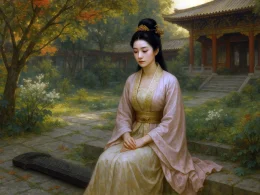My friend lives in the east mountain’s hold,
He loves the beauty here, be it new or old.
He sleeps in the woods in spring day bright,
And never rises till the sun is high.
The wind in the pines refreshes his breast;
The water in the rock cleans his ears and eyes.
I envy you from all worries a rest,
And pillow on the cloud in the blue skies.
Original Poem
「题元丹丘山居」
李白
故人栖东山,自爱丘壑美。
青春卧空林,白日犹不起。
松风清襟袖,石潭洗心耳。
羡君无纷喧,高枕碧霞里。
Interpretation
This poem is Li Bai's tribute to his close friend Yuan Danqiu's mountain retreat life. Yuan, one of Li Bai's most important Taoist companions throughout his life, shared profound spiritual affinity with the poet. The work not only vividly depicts Yuan's transcendent recluse image but also deeply embodies Li Bai's own yearning for reclusive life and detachment from worldly turmoil.
First Couplet: "故人栖东山,自爱丘壑美。"
Gùrén qī dōngshān, zì ài qiūhè měi.
My old friend dwells on Eastern Hill; Loving these valleys' beauty at will.
The opening states subject, location and circumstance with plain directness. "Loving at will" is key—revealing the internal motivation behind Yuan's reclusion, stemming from genuine love for nature's beauty rather than external pressure, establishing the poem's transcendent tone.
Second Couplet: "青春卧空林,白日犹不起。"
Qīngchūn wò kōng lín, báirì yóu bù qǐ.
In spring's prime he lies in empty woods; Still abed when sunlight floods.
This couplet portrays the recluse through typical details. "Spring's prime" contrasts ingeniously with "lying in empty woods"—while ordinary people venture out to enjoy spring, the recluse rests peacefully, highlighting his unique life rhythm and values. "Still abed when sunlight floods" isn't laziness but deliberate defiance of worldly "diligence" norms, showcasing absolute spiritual autonomy.
Third Couplet: "松风清襟袖,石潭洗心耳。"
Sōng fēng qīng jīn xiù, shí tán xǐ xīn ěr.
Pine winds cleanse his sleeves and heart; Rock pools cleanse his mind's every part.
Here the focus shifts from external traces to inner cultivation, employing allusions for profound意境. "Pine winds cleanse sleeves" signifies external purity, while "rock pools cleanse mind" subtly echoes the legend of Xu You washing his ears in Ying River after declining Yao's throne offer, symbolizing complete rejection of worldly fame and noisy information. "Cleanse" through wind and water accomplishes spiritual purification from outside in.
Fourth Couplet: "羡君无纷喧,高枕碧霞里。"
Xiàn jūn wú fēn xuān, gāo zhěn bì xiá lǐ.
I envy your freedom from noisy fray; Pillowed high where azure mists play.
The conclusion directly expresses emotion, clarifying the poem's dedicatory purpose. "Envy" is the poetic eye, crystallizing Li Bai's full affirmation and yearning for his friend's lifestyle. "Freedom from noisy fray" negates the mundane world, while "pillowed high where azure mists play" poetically sublimates reclusive life, framing Yuan's image in an immortal-like picture.
Holistic Appreciation
The poem's structure is precise, following a clear progression from "person to scene, exterior to interior, culminating in expression." The first couplet outlines the recluse's uniqueness; the second delves into his spiritual world and expresses personal aspiration. Li Bai skillfully portrays Yuan Danqiu as an image blending Taoist reclusive ideals with Wei-Jin scholar demeanor—his "lying in empty woods" and "cleansing mind" represent both return to nature and adherence to independent personality. The poem conveys profound meaning through plain description, expressing ultimate admiration for a highly self-aware, spiritually free lifestyle.
Artistic Merits
- Integration of Detail and Symbolism: Selecting specific life fragments like "lying in woods," "listening to winds," and "facing pools" makes them tangible while carrying spiritual significance beyond daily life.
- Allusion Integration and Innovation: The "cleansing mind" allusion blends seamlessly without artifice, deepening poetic meaning and enriching cultural connotations.
- Strategic Contrast: Juxtaposing "spring's beauty" with "woodland stillness," and "worldly noise" with "azure mist paradise" intensifies reclusive life's value and charm.
- Simple Language with Rich Connotation: Nearly unadorned and natural as speech, yet precise verbs like "dwell," "love," "cleanse," and "envy" convey emotion and意境 with remarkable fullness.
Insights
This poem reveals a timeless proposition: how to settle oneself in a turbulent world. Yuan Danqiu's "mountain dwelling" isn't passive escapism but active choice and construction of a space maintaining spiritual independence and clarity. It enlightens us that true peace may lie not in avoiding crowds but in building inner defenses against external "noise," finding our own "azure mist" for "peaceful rest." In our era of information explosion and rapid pace, this wisdom of guarding inner purity and maintaining spiritual autonomy remains particularly precious.
About the poet

Li Bai (李白), 701 - 762 A.D., whose ancestral home was in Gansu, was preceded by Li Guang, a general of the Han Dynasty. Tang poetry is one of the brightest constellations in the history of Chinese literature, and one of the brightest stars is Li Bai.












